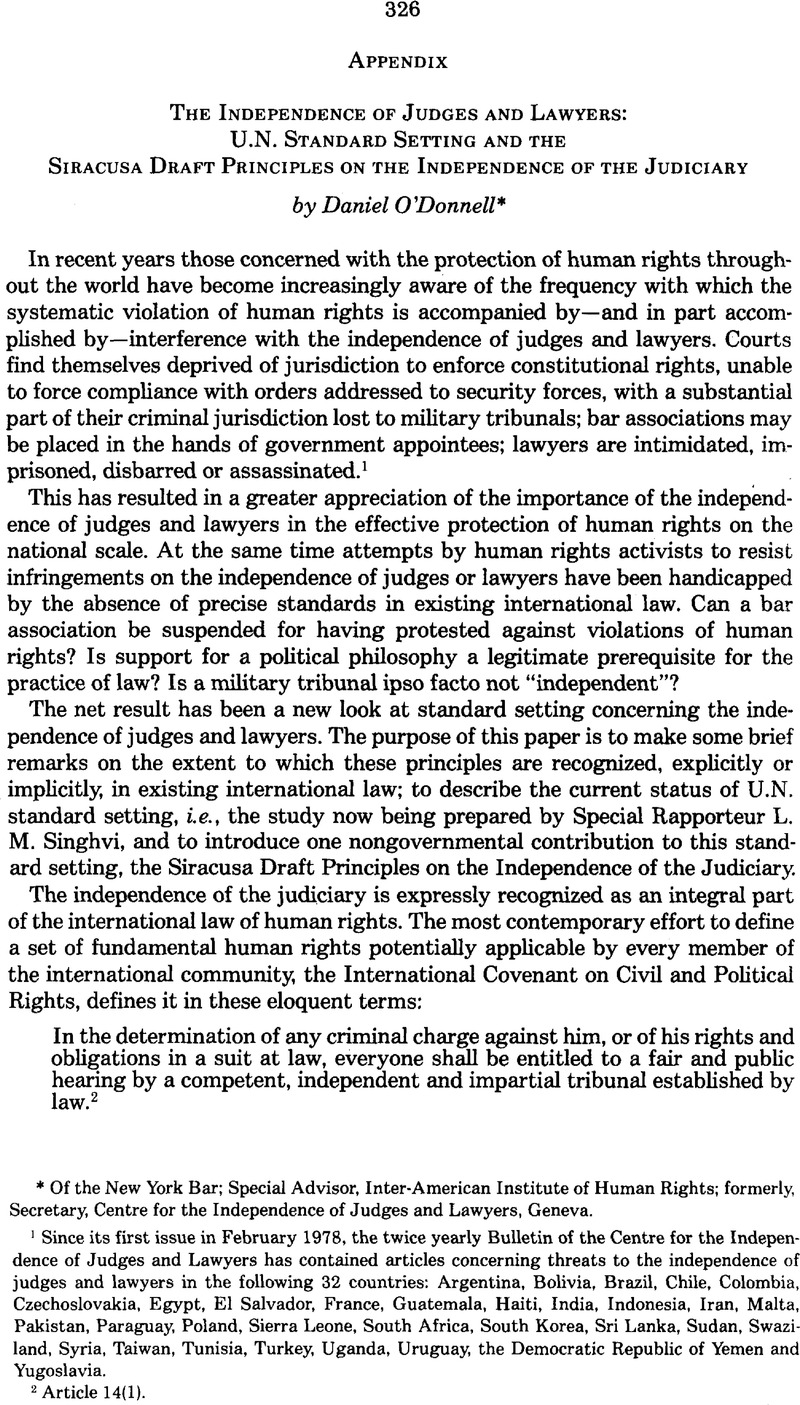No CrossRef data available.
Published online by Cambridge University Press: 28 February 2017

1 Since its first issue in February 1978, the twice yearly Bulletin of the Centre for the Independence of Judges and Lawyers has contained articles concerning threats to the independence of judges and lawyers in the following 32 countries: Argentina, Bolivia, Brazil, Chile, Colombia, Czechoslovakia, Egypt, El Salvador, France, Guatemala, Haiti, India, Indonesia, Iran, Malta, Pakistan, Paraguay, Poland, Sierra Leone, South Africa, South Korea, Sri Lanka, Sudan, Swaziland, Syria, Taiwan, Tunisia, Turkey, Uganda, Uruguay, the Democratic Republic of Yemen and Yugoslavia.
2 Article 14(1).
3 Article 10. The most notable difference with the Covenant is the omission of the word “competent.” A brief comment on the significance of the term may be found in Muhammad, Due Process of Law for Persons Accused of Crime, in THE INTERNATIONAL BILL OF RIGHTS 138, 147 L. Henkin, ed. (1981) at 147 [hereinafter Muhammad].
4 Article 6(1) of the European Convention (1950) refers to the right to “an independent and impartial tribunal established by law” in both criminal and civil matters. Article 8(1) of the American Convention (1969) refers to the right to “a competent, independent and impartial tribunal, previously established by law” in both criminal and civil matters. In contrast, Article 26 of the American Declaration on the Rights and Duties of Man (1948) refers only to the right to an impartial hearing in a “previously established” court, and this only in criminal matters. An exception to the trend to define the right to independent courts more generously in modern human rights instruments, Article 7 of the African Charter on Human Rights and Peoples Rights (1981) refers only to the general right of access to “an impartial court or tribunal,” and in criminal matters the right to “a competent court or tribunal.” There is no mention of the independence of courts or tribunals.
5 International Convenant on Civil and Political Rights, Art. 14(3)(b). Compare the European Convention, Art. 3(b) and (c), and the American Convention, Art. 8(2) (c) and (d).
6 W a t Art. 14(1).
7 See Muhammad, supra note 3, at 146.
8 Resol. 13 (XXXIII).
9 U.N. Doc. E/CN.4/Sub.2/428.
10 Resol. 5A (XXXII) and Resol. 16 (XXXVI).
11 Decision 1980/24.
12 Resol. 1979/34.
13 U.N. Docs. E/CN.4/Sub.2/L.731 (reprinted in CIJL Bulletin No. 6, Oct. 1980) and E/CN.4/ Sub.2/481.
14 The Committee Chairman and Project Coordinator is Justice D. K. Haese of Australia, and its General Rapporteur is Dr. Shimon Shetreet of the Hebrew University of Jerusalem.
15 Dr. Singhvi in fact participated in the meeting and subsequently submitted the Siracusa Draft Principles to the Sub-Commission as an addendum to his interim report. See U.N. Doc. E/ CN.4/Sub.2/481/Add.l.
16 The inclusion of “language” seems to be the unintentional result of hasty borrowing of the language of Art. 2(1) of the Convenant on Civil and Political Rights.
17 Mr. L. Joinet (substitute for Sub-Commission Mrs. N. Questiaux) on 1 September 1980, summarized in U.N. Doc. E/CN.4/Sub.2/SR 869 page 5. The Siracusa documents referred to are The Need for a Balance in the Appointment of Judges by Justice Lionel Murphy of Australia (reprinted in CIJL Bulletin No. 8, October 1981) and the author's own working paper, which proposed the following principle: “In order that the judicial branch be democratic and representative, ail reasonable steps should be taken in the appointment and training of judges and magistrates to ensure that women and persons from national and racial minorities and under-privileged classes are fairly represented in the judicial branch.“
"In order that the judicial branch be democratic and representative, ail reasonable steps should be taken in the appointment and training of judges and magistrates to ensure that women and persons from national and racial minorities and under-privileged classes are fairly represented in the judicial branch."